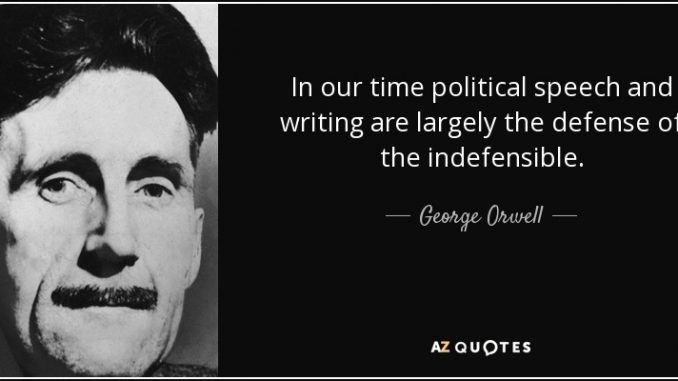
by Patrick LeClerc
Our writing will always be shaped by our values, our opinions and our politics. That’s inevitable. It’s even more evident in fantasy or s/f where we are creating a world of our own, not just showing our current one through our lens. It’s very tempting to write a story that justified our own beliefs.
Resist that impulse.
Now, it’s not like you can hide your feelings and write from your heart at the same time. I’m not advocating that you stop thinking slavery was bad while writing your Civil War historical fiction. Just try to remember you’re writing a story, not a manifesto.
This applies only to fiction. If you are trying to write a manifesto, well, go fight the power. But readers are smart enough to spot the heavy handed stuff for what it is. Reading Atlas Shrugged will never convince a socialist to stage an anti tax rally and start voting for Rand Paul. It’s just going to make people who already agree with it feel vindicated and those who disagree roll their eyes.
If you paint every politician as corrupt, or every cop as crooked, or all protesters as violent or naive, then you’ve written a political speech or an after school special.
S/F has long been a genre where authors built utopias and dystopias, using them to justify one political philosophy or another. The problem is that we have too much power. If we think all taxation is theft, all we have to do is make all tax collectors thieves and we’ve proven our point.
At the same time, it’s more than OK to paint a fascist government as bad or the resistance as overall on then right side of history. False equivalence isn’t much better than jingoism.
People will see political agenda. Sometimes they’ll see one even when you aren’t trying to push it. I was called out by reviewers of my near future s/f In Every Clime and Place because I had several women as characters in a Marine infantry unit. Now, I put them there because that’s how things are going even today, and I can’t see a military in 75 years that still segregates units by gender. I put them there because it makes sense for them to be there. Hell, look at Aliens from 1986 or the film version of Starship Troopers. We expect a more diverse future, because that’s the trend. I think writing about an all male infantry in 2075 would be like writing about a racially segregated military in 2017. It would seem a strange omission.
What I didn’t do was get on a soapbox about it. If I’d had them constantly underestimated and marginalized by their make peers despite being better and smarter, and then had them save the day unassisted, that would have been Making a Point. Just as if I’d had them be overly emotional, dependent and a weak link that hurt the unit cohesion and cost lives in combat, that would have been Making a Point.
What I did do was try to be faithful to real life. I had a relatively small proportion of women in infantry roles, as that tends to reflect the fact that fewer women seek those assignments, and qualify for them than men. I didn’t make them Wonder Woman, not did I make them a weak link who had to be bailed out and carried and rescued. I made them competent Marines who did their jobs. I addressed the issues with squadmates who didn’t like serving with women, and had characters voice concern about how it changed the dynamic.
I didn’t make it black and white where everyone who disagreed with my opinion on the subject was wrong and a bigot or naive and a threat to my beloved Corps. I didn’t make it the central theme of the story, but I wove it in as a thread.
I wrote them as characters, not as caricatures. People, not symbols.
So I think the answer is not to ignore the issues, and not to just give everyone a black hat or a white hat. Make your characters people with depth and facets and motivations. And understand that there are noble impulses and base impulses on all sides, and the book will read like a real story, not a fairy tale with handsome prices and wicked witches.
Readers aren’t idiots. Don’t treat them like they are.
When Writing “Fiction” whatever issue covered will usually be considered fictitious.
Consider – “Fahrenheit 451”. Also Scifi & Horror stories.
Your greatest concern is “Non-fiction”. Alway have support for ALL you write about.
Many authors have failed because they couldn’t support the story when questioned.
You are so right on 1 point – Readers aren’t idiots.